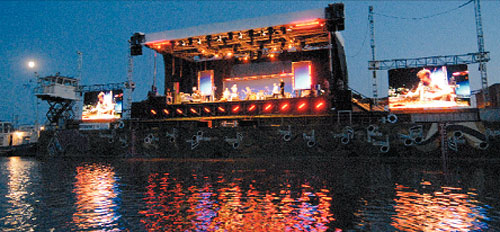LINZ EUROPE TOUR 2007-2009
Hubert von Goisern: Live in Belgrade - 23rd August 2007
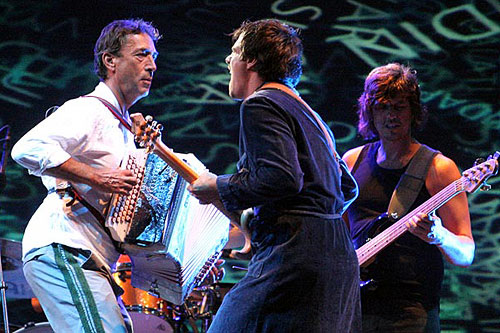
Goisernlog
On 5th June 2007 when he wanted his convoy of ship the MSS Josef Brandner in Budapest for the first time, Hubert von Goisern was greeted at the agreed upon jetty at Batthyány Tér by a local with the words: "If you dock here, I'll break your teeth."
Although actually everything was organised and set. So the lifeguard service were called for help. They came and cleared things up, in that they slapped the musicians, who wanted to give a free concert in the Hungarian capital, with a docking fee of 2800 Euros. A press conference had not been prepared. Again, something very different had been discussed. And because they were told that journalists and media representatives in Budapest do not work after 3pm anyway, it did not make any sense to improvise anything. In any case the guest band Beshodrom had completely forgotten or displaced the date or whatever for a lucrative show abroad...
"It is not the Europe I dream of," Hubert von Goisern wrote that evening in his logbook. "It is perhaps the Europe of spongers and delimiters, but it is not mine."
It has been a few years since I read Christopher Columbus's logbook, and soon after that with great enthusiasm, John Steinbeck's The Log from the Sea of Cortez.
But it is only since this summer that I have known why this new world blog, the abbreviation of weblog, was derived from log(-book), the invention of Christian seafarers to record their navigational data and experiences every day in a book. That is why my long-time and always highly recommendable favourite blogs (Bildblog.de, Perlentaucher.de and Else Buschheuer's page) have now been joined this summer by the Goisern logbook, the report of a musical expedition into unknown Europe.
Once down the Danube from Linz to the Black Sea and then back again. Thus a modern adventurer, dreamer, free person, dreamer and intense musician with great passion fulfils a life's dream: the dream of a new, united Europe. The people and melody-fisher Goisern collected as he went downstream: musicians, music and in particular experiences with authorities and officials. Now he is taking his amazing loot back to the home port in Linz.
And because he is not just writing his logbook, but is also putting online too, we read: the story of someone who set off to be scared stiff. What are the heat, storms and the natural adversities of the Christian inland navigation craft travel against the European bureaucrats, narrow-minded people, uniform-wearers and oligarchs. Travelling the Danube with a music steamer seems to be a greater adventure today than any crossing of the Atlantic.
Now Tuesday evening, in the organisational slipstream of the Hungarian national holiday, to which Red Bull this year conferred the wings of a bombastic flying show, there was in fact a concert in Budapest. Beshodrom were there too. A few VIPs happened to remain from the big flying show, a few Budapest residents were there as well as about a hundred Goisern fans and logbook readers from Austria, Bavaria and Recklinghausen. A grand and also very loud concert in front of a magical backdrop.
Despite the enormous Indogermanic-Finno-Ugrian language barriers, the listeners very nearly came to a European friendship and exchange of addresses. Then an enormous downpour meant that everyone sobered up and ran off frightened, probably according to nationality, territorial associations and accommodation category.
Down the Danube on a concert ship
At the point where the Danube flows into its delta, it is wide and sluggish. Cows graze in the broad meadows of the river banks, here and there a couple of naked children jump into the water. One by one the musicians and ship's crew come out of their cabins, sit at the large table, eating, reading, relaxing. Quiet sounds mix with the swoosh of the awnings: someone is playing a bandura, a kind of zither as is used by the Cossacks in the Ukraine. Another is plucking a few sounds on an acoustic guitar.
Hubert Achleitner, known as an alpine world musician under the name Hubert von Goisern, laughingly allows himself to be showered with the hose. The singer Maria from Vienna curls up tiredly between the boxes of equipment on the stage. It is coolest here.
The evening before euphoria had been pulsing on this stage. The Moldovan band Zdob și Zdub had managed to get the crowd leaping about on the shoreline of the Ukrainian town of Ismail long before Hubert von Goisern started to play his old Hiatamadl hit on the accordion. The yodelling jumped to the Moldovan beat and was confidently countered with a rap by Zdob și Zdub singer Roman, the content of which remained a mystery to the visitors from the west - but what had the Ukrainian press been told that afternoon at the highly official press conference with the mayor and interpreter? The language of music is universal.
It is for exactly these kinds of moments that Hubert von Goisern has set off on his long journey. At the beginning of the nineties the Austrian made a name for himself with his both impudent and very seriously-meant update of the traditional music of his homeland. Since then he has also tried out his concept of world music together with musicians from Tibet and Africa.
The Goisern band went on board their floating tour vehicle, consisting of a barracks ship and raisable stage in festival format, together with light show and screens for films and visuals. They are travelling with this eastwards along the Danube and back again until 1st September, giving a good 20 concerts along the way, to which they are inviting local musicians. Next summer the tour will take go west, through the Rhine Main canal up to Rotterdam, in 2009 the finale will be a festival with all the participating bands in Linz.
Hubert von Goisern has been working for two years on the realisation of this dream of a unifying Danube tour - the idea came to him while he was fishing, he says as his ship chugs eastwards once more. "When you're not catching anything, you're left with your thoughts." He is not the first to have had this idea, but he is the first to have put it into action. One needs a great deal of patience not to be frustrated by the intractable bureaucracy of the various Danube countries. And you have to have money, because one will not be able to ask for an admission fee from the people in Novi Sad, or the little town of Ismail in the Ukraine.
The journey is costing 4 million Euros, half coming from an Austrian drink manufacturer, a million should be brought in by the concerts in Western Europe and a million is coming from the city of Linz's budget, the city which will be European Capital of Culture in 2009 and has in advance made Hubert von Goisern their ambassador with this east-west tour.
Thus Martin Heller, manager of Linz's Capital of Culture programme also goes to the meeting with the journalists on Hubert von Goisern's boat. The tour is the ideal "content" for him to profile the city on the Danube as a cultural centre between Europe's east and Europe's west. When the Capital of Culture year begins there will be a film documentary, Hubert von Goisern's logbook, in which he is writing about his journey on the internet, one will have a piece of European reality to touch and listen to.
And Hubert von Goisern would never use a term like "content", but when his interests align with those of the Capital of Culture Linz, he's on board. He keeps this undertaking, which you cannot label as anything other than adventurous, together with an effective mixture of spirituality and pragmatism. The worst thing so far has been the heat, which has been 40ºC for many weeks. You just can't avoid nature, Goisern says calmly. To experience and determine this you can go still further and give concerts and keep your senses open to everything that happens and that has made him and his band strong.
Of course Hubert von Goisern also knows that not has everybody has been waiting for him here in the east. Whenever the ship drops anchor new surprises await: sometimes the local authorities have not announced the concert despite all agreements, as in Croatia, and only a few hundred people come along; sometimes the originally anchoring place has long been built on. In the Bulgarian town of Silistra they wanted to let Goisern play in front of the private terrace of a hotel with a few invited guests - without hesitation he had the anchor raised and played a few hundred metres way for the crowd on the beach.
The meetings with foreign musicians have also not all been as relaxed as with the Moldovans Zdob și Zdub. Some have had no desire for joint rehearsals and making friends on the water. And the smaller the location in which they appear, the more bizarre the visitation by this high-tech concert ship seems. It helps that Goisern makes a humble appearance, always yielding to the guest musicians, patiently telling the local journalists and audience about his project - and the poise with which he accepts the unusual painted vases as a gift cannot be described as anything other than professional.
The vase from Ismail has been given a place of honour on the buffet table as the ship continues towards the Black Sea. The band Haydamaky from Kiev has come on board, they will travelling to the next joint concert and are visibly happy on the sunlit ship.
"I grew up in the time of the Soviet Union, with Led Zeppelin records that we got from somewhere and a Romanian radio station that played folk music - the only one that didn't broadcast propaganda," says Sascha, the bald-headed Haydamaky singer.
The result of this musical socialisation is a rousing Carpathian ska, which the band recently released on the Berlin record label Eastblock; clearly more intelligent than the vodka-merry techno polka that is sold on the Russendisko label here from time to time. When he is asked about Hubert's yodelling, Sascha has to laugh: "Ah, I prefer gypsy music - but it's an authentic expression of Hubert's culture, so it's okay."
That evening it is evident in the small city of Vylkove too - even if amazement is written across the faces of the people when they see the concert ship setting off its light show towards them a few metres from the riverbank.
8000 people live here, the plastic toys in the little market come from China and the silver statue of Lenin looks as though it has been freshly painted. The Danube regularly floods into the city and climbs high against the houses, the people are used to it. But it is likely that a sound such as this has never come from the water before. Mothers have come along with their adolescent daughters on their arms, in flowery dresses and with the most beautiful slides in their hair. Little children snuggle up to their grandfathers, couples hold each other, here and there a group start to dance, laughing away. Perhaps they did not notice the name of the crazy Austrian who has paid them a visit. But nevertheless, they will never forget this night.
A UFO has landed
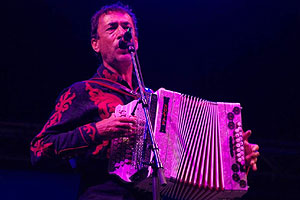 22
Danube harbours, more along the Rhine and Main, around forty concerts
and numerous encounters - the Austrian world musician Hubert von Goisern
is on a ship on the Linz Europe Tour. In a unique three year project
he will be making the many voices of Europe sound together.
22
Danube harbours, more along the Rhine and Main, around forty concerts
and numerous encounters - the Austrian world musician Hubert von Goisern
is on a ship on the Linz Europe Tour. In a unique three year project
he will be making the many voices of Europe sound together.
There is an explosion at the start. Accordion, drums and electric guitar boom across the smooth surface of the water with 280,000 watts. An optical-acoustic tidal wave sloshes forth from the concert stage floating on the Danube over the heads of the 2000 people on the Vylkove quayside. "A Griasknedl und a Leberknedl ham si gor ned vertrong", sings Hubert von Goisern.
Who is this "Chubert"?
A UFO has landed. On board are musicians from Austria and the Ukraine, who with electric guitar, bass, drums, accordions, keyboard, violin, dulcimer, flute, percussion and singing are showing that Europe can at least speak one language musically. "Who is this Chubert?" asks the 26-year-old Dmitrij and his eyes look as though they want to say: "Who is this doing something so crazy?" For ten years Dmitrij has been heaving tonnes of crabs out of the Black Sea with a crane. He cannot speak German and only a little English, he likes to listen to Rammstein and has never experienced a concert in his hometown.
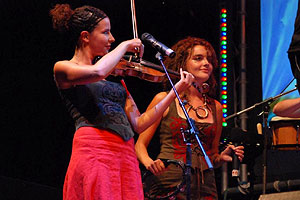 The
8000 inhabitant town of Vylkove is the easternmost Ukrainian settlement
in the Danube delta, where 280 species of bird and 100 species of fish
are to be found. Aside from the water, only marshland stretches to the
horizon here, no use for farming. The short people live from and with
the river. A statue of Lenin still stands in the middle of the town.
And now this sound. Who is this "Chubert"?
The
8000 inhabitant town of Vylkove is the easternmost Ukrainian settlement
in the Danube delta, where 280 species of bird and 100 species of fish
are to be found. Aside from the water, only marshland stretches to the
horizon here, no use for farming. The short people live from and with
the river. A statue of Lenin still stands in the middle of the town.
And now this sound. Who is this "Chubert"?
Alpine world music on European tour
The 54-year-old Hubert Achleitner, who at the end of the eighties hung the electric guitar onto folk music and reconciled yodelling, harmonicas and accordions with rock and pop under the label of "alpine world music", has taken it into his head to bring the east and west of Europe closer together with a three year concert tour. Where EU politics creates more hurdles than it dissolves animosities, he has plumped for the language of music: without borders, prejudices, delaying tactics. It befits today and here.
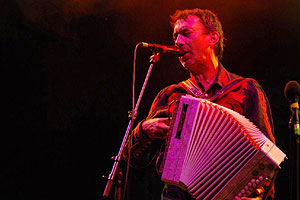 This
summer the expedition by ship goes east from Linz and hen back again,
next year it goes westwards through the Rhine-Main canal up to Rotterdam. On
the way Goisern and his band will be meeting about 40 local groups, with
whom they will give concerts and work together on joint pieces. All the
events in the east are free. The crowning finale will be a festival held
over a few days in summer 2009 in Linz, which will be the European Capital
of Culture together with Lithuanian city of Vilnius.
This
summer the expedition by ship goes east from Linz and hen back again,
next year it goes westwards through the Rhine-Main canal up to Rotterdam. On
the way Goisern and his band will be meeting about 40 local groups, with
whom they will give concerts and work together on joint pieces. All the
events in the east are free. The crowning finale will be a festival held
over a few days in summer 2009 in Linz, which will be the European Capital
of Culture together with Lithuanian city of Vilnius.
No half measures for the title of Capital of Culture
Intendant Martin Heller is supporting the project both spiritually and financially. He "doesn't want to just set off a huge firework", but rather in advance "do something that expresses these thoughts - that Linz lies in Europe, we are at the centre and have a purpose". The Upper Austrian capital city is thus the navel of the tour and home port of the 100-metre long, 16-metre wide ship convoy. Linz is using this project to promote itself for the title of Capital of Culture 2009.
Alpine rock on the Danube
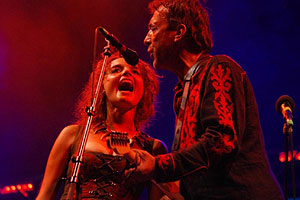 On
a barge that has been converted into a stage ship, having once transported
sand and gravel, the 119 square metre festival stage rests with the same
principle as an accordion: the roof is on hydraulic legs. Brought down
during travelling time, it has a headway of six metres when erected.
On and below deck lives a 25-strong crew - including eight band members
- in a kind of large-capacity living community, which grows when local
groups come on board.
On
a barge that has been converted into a stage ship, having once transported
sand and gravel, the 119 square metre festival stage rests with the same
principle as an accordion: the roof is on hydraulic legs. Brought down
during travelling time, it has a headway of six metres when erected.
On and below deck lives a 25-strong crew - including eight band members
- in a kind of large-capacity living community, which grows when local
groups come on board.
Underdogs among themselves
"Subjectivity, not objectivity" is what figurehead Hubert von Goisern is looking for, visiting countries where war recently reigned and states at whose edges an EU outer border suddenly docks, shutting them out. He wants to show that everything is nonetheless closely connected and is a cultural area; that his yodel can for example combine wonderfully with the energetic ethno-rock-punk of the Moldovan group Zdob și Zdub, or the Carpathian ska of Haydamaky from Kiev (see interview). They are competitors on the local market, after the concert they jam together on the ship. Haydamaky singer Oleksandr Yarmola compares the EU regulations to stones. His band was discovered in 2001 by EMI, their new CD is being released in the autumn on the Berlin label Eastblock, but they still have problems getting EU visas. "We, the project, are drops of water that attract more drops and will one day erode the stone." With their mixture of Ukrainian folk music, ska, punk and reggae Haydamaky fit as well into genre categories and commercial radio as Hubert von Goisern's alpine world music. They fit together all the better.
Ambassador of sound from the Salzkammergut
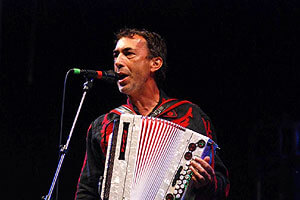 It
is the vision of someone far-travelled, one who encounters the unfamiliar
with an open heart. When he is convinced of something, he really gets
going. Then there are obstacles to be taken on. The strong character
does not put up with a backwards step. When years ago Goisern wanted
to interpret and record the musical impressions after a journey to Tibet,
he was told that permission would have to be given by the religious and
political leader. So he organised an audience with the Dalai Lama. The
wise old man was convinced of the honest intention and the clear will
of the ambassador of sound from the Salzkammergut and agreed.
It
is the vision of someone far-travelled, one who encounters the unfamiliar
with an open heart. When he is convinced of something, he really gets
going. Then there are obstacles to be taken on. The strong character
does not put up with a backwards step. When years ago Goisern wanted
to interpret and record the musical impressions after a journey to Tibet,
he was told that permission would have to be given by the religious and
political leader. So he organised an audience with the Dalai Lama. The
wise old man was convinced of the honest intention and the clear will
of the ambassador of sound from the Salzkammergut and agreed.
The Salzburg resident prepared the large-scale project "Linz Europe Tour" for two years, obtained various permissions, sought and found venues and bands with whom he wants to transform his vision. He had the idea of a floating festival to unite people ten years ago at Tanganyika Lake in Zaire, where he made a documentary about the primate research scientist Jane Goodall. He organised an unplugged concert with musicians from ethnic groups who had fought. Two years ago the hobby fisherman was then standing on a ship belonging to Franz Brandner on the Danube: "We didn't catch anything all day, You have time to think when things are so dull."
The vision becomes a reality
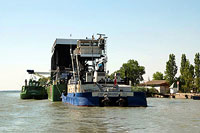 The
inventor of an enormously successful Austrian energy drink did not have
to think for long when he heard about the project. He contributed two
of the four million Euros, another was given by "Linz 09" intendant
Heller. Here people have come together for whom - as Goisern's manager
for many years Hage Hein explains - "the unique idea is more successful
than contractual clauses". The vision becomes a reality.
The
inventor of an enormously successful Austrian energy drink did not have
to think for long when he heard about the project. He contributed two
of the four million Euros, another was given by "Linz 09" intendant
Heller. Here people have come together for whom - as Goisern's manager
for many years Hage Hein explains - "the unique idea is more successful
than contractual clauses". The vision becomes a reality.
Solo for the moon
Goisern has just arrived at the easternmost point of the journey, in the Ukrainian Danube delta. The river that divides and unites countries passes through ten countries and becomes ever broader, shallower and calmer before it reaches the delta after almost 3000 kilometres. In conversation Goisern exudes a serenity that is similar to that of the river.
"I'm blowing them all away"
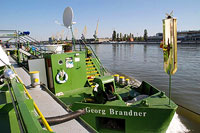 In
the eastern European countries it was worth persuading the mayors beforehand. "They
were all enthusiastic," the pioneer remembers. They shook his hand,
clapped him on the shoulder, wished him a lot of luck. "but you
can count on one hand the number of them that have actually really done
something." The anger resonates in his voice. The city leaders were
persuaded, the police or local oligarchs put their foot down - and still
do today. The battle continues almost every day, but out of necessity
the victories increase. "I think it's super," says Goisern
triumphantly, "now I'm standing here and I'm blowing them all away."
In
the eastern European countries it was worth persuading the mayors beforehand. "They
were all enthusiastic," the pioneer remembers. They shook his hand,
clapped him on the shoulder, wished him a lot of luck. "but you
can count on one hand the number of them that have actually really done
something." The anger resonates in his voice. The city leaders were
persuaded, the police or local oligarchs put their foot down - and still
do today. The battle continues almost every day, but out of necessity
the victories increase. "I think it's super," says Goisern
triumphantly, "now I'm standing here and I'm blowing them all away."
Optically and acoustically in the truest sense. Wolfgang Spannberger developed a sound system especially for the project, concert clips from two cameras are projected live on two 5.8 x 2.9 metre LED walls next to the stage and composed with visuals to an optical synthesis of the arts.
Yodel punk in polka time
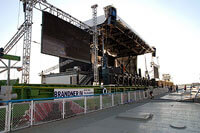 A
shy moon shines down on the convoy from the night sky over Vylkove, accustomed
to being the only star of the evening with its reflection in the calm
waters of the Danube. The multi-voiced yodelling on stage is now stealing
the show. The residents have dressed up for the unique event. Old men
wear their crisply ironed shirts tucked into their trousers, their wives
wear costumes printed with large flowers, teenagers and young women proudly
model silky, shimmering dresses or figure-hugging short skirts and tops.
A young girl merrily beats the polka rhythm with an empty water bottle
and some of the grandmothers can't keep still during the yodel
punk.
A
shy moon shines down on the convoy from the night sky over Vylkove, accustomed
to being the only star of the evening with its reflection in the calm
waters of the Danube. The multi-voiced yodelling on stage is now stealing
the show. The residents have dressed up for the unique event. Old men
wear their crisply ironed shirts tucked into their trousers, their wives
wear costumes printed with large flowers, teenagers and young women proudly
model silky, shimmering dresses or figure-hugging short skirts and tops.
A young girl merrily beats the polka rhythm with an empty water bottle
and some of the grandmothers can't keep still during the yodel
punk.
Because the river is so shallow the floating stage is anchored about 20 metres from the quay, despite its minimal depth of 1.4 metres. It is a shame, it does not solve the impression of the UFO. The artists are a long way from the audience, there is barely any communication.
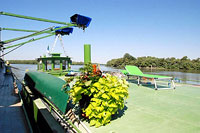 One
Vylkovan man cannot take it any more. He had spent the first half of
the concert enthusiastically dancing and jumping in his docked rowing
boat. Now with a dart he jumps into the water, runs and swims right up
to the stage, where the water comes up to his chest. With his enthusiasm
he shows Haydamaky and the Hubert von Goisern
band that the exertions were worth it. There was never anything like
this is Vylkove.
One
Vylkovan man cannot take it any more. He had spent the first half of
the concert enthusiastically dancing and jumping in his docked rowing
boat. Now with a dart he jumps into the water, runs and swims right up
to the stage, where the water comes up to his chest. With his enthusiasm
he shows Haydamaky and the Hubert von Goisern
band that the exertions were worth it. There was never anything like
this is Vylkove.
Solo for the moon
After the last sounds nearly all the guests return home happy. Only a group of women in their late fifties, who danced exuberantly during the concert, have not yet had enough. "Hu-bert, Hu-bert," they chant, skipping about. Then they sit down, laughing, on the quayside. What remains is the moon, which now has its appearance for the aftershow party.
"Between panic and exploding"
Hubert von Goisern in interview
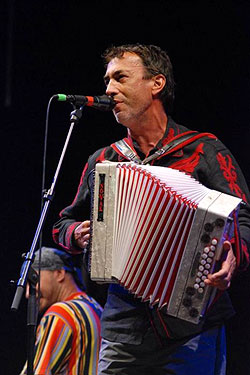 Hubert
Achleitner, better known as Hubert von Goisern, has been travelling the
Danube eastwards as a European ambassador of sound for a good month now,
together with his band and crew. FOCUS Online met him in the Ukrainian
delta, just before the point where the European river runs into the Black
Sea.
Hubert
Achleitner, better known as Hubert von Goisern, has been travelling the
Danube eastwards as a European ambassador of sound for a good month now,
together with his band and crew. FOCUS Online met him in the Ukrainian
delta, just before the point where the European river runs into the Black
Sea.
Tanned deep brown, he sits on deck the MSS Josef Wallner in his dark sunglasses. The night was short and at first Achleitner speaks very quietly. But in the course of the conversation he comes ever more alive. They are the wild gestures of a person who stands on stage a great deal. The energy which has taken the musician from the Salzkammergut halfway around the world in past years is palpable.
You have travelled far and wide, to Asia and Africa. Only now are you discovering a region that lies geographically closer. Must one first leave in order to return?
As a young man I thought: you can do everything that lies closer later on. I went as far away as possible. Life is a spiral: you come ever closer to what you are looking for.
What are you looking for on this journey, with which you wish to draw attention to the unity and variety of European culture?
I am looking for adventure. Not as a voyeur, but for myself. I prefer that. I don't like following paths, certainly not always the same ones. And I like situations where I am forced to keep all my senses awake. That is the case with so many new impressions.
Nevertheless you always see the new while taking the folk music of the alpine region with you. What does tradition mean to you?
It is like a rucksack that we carry through life. For some people it is very heavy and so they don't manage to move forwards. As a youth I also noticed that I had been given something quite wonderful to carry and at some point I began to unpack it and clear it out. If the rucksack is full, nothing more will fit inside.
How do the musicians whom you are meeting on the Linz Europe Tour deal with tradition?
I have found brothers and sisters in spirit - a wonderful affirmation. You often imagine that you are the only one to have discovered the philosopher's stone and others have not. Then you are amazed to find that others have the stone too. I like that.
Over the course of these three months you will play with more than 100 colleagues, having little time to rehearse. What feelings do you have standing on stage?
It is all between panic and exploding. I sometimes feel I'm dissolving into my atoms. I'm trying to take everything and give everything out at the same time. You have to let what is happening happen.
Would you have thought that your yodelling and the Carpathian ska of the Ukrainian bands would go together so well?
Yes, at least with the all the polka pieces. But of course there is no certainty that it will always work so well.
One gets the impressions at the concerts that the Balkans are particularly full of energy. Is that just a cliché?
No, there is a tradition of that here. This cha-cha-cha-cha (he balls his fist, underscoring the rhythm with his forearm), I like it when it goes completely offbeat: mta-mta-mta! In our music it's all right on the beat, bum-bum-bum, so that people can clap along and know what they're doing: dei-didi-dadam .. (he sings, claps, laughs, swaying his torso to the rhythm)
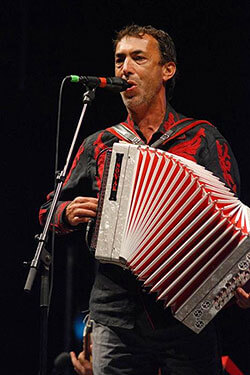 What
has happened in the month in which the musicians and crew have been on
board?
What
has happened in the month in which the musicians and crew have been on
board?
We have gained self-confidence and trust that what is happening is valid and has integrity. The experience of sliding down the Danube is unbelievable. The river exerts a gentle force from which you cannot escape. Of course this project is exhausting in many ways. But we are becoming ever stronger, and with the strength comes calmness.
Are you happy with the response?
It's getting better and better. Croatia was our first stop in the east. I was taken aback by the lack of interest, particularly from those who were meant to put together the local infrastructure. I interpret it with the trauma of war. One doesn't have the courage to build anything as there was shooting only shortly before. It was one of the most moving concerts, playing in front of 350 people between shot ruins and burned tree stumps.
You once said: "I won't play Hiatamadl any more". But now you are doing so?
I said that I didn't know when I would play it again. I played that and other songs so often and I don't like things to become mechanical. I need distance to let something new develop. Now I have that.
You are offering a kind of "best of" for the first time. Why?
The people here don't know me and I want to introduce myself to them. We have a three hour programme and are playing about an hour and a half of it. So I can decide relatively spontaneously what suits the ambience. Yesterday (the concert with Haydamaky and Zdob și Zdub) more ballads would have been out of place. The people were electrified.
Are you still nervous when you have to appear after the local matadors' act?
Every time you begin a yodel it is a jump from the 10-metre board into the water at night. You have no idea how you're going to come up. But so far it has always worked out well.
"Koa Hiatamadl" in Californian
Hubert von Goisern and his band have arrived in the
poor outback of the Danube delta:
a report from almost the furthest point that the Linz Europe Tour will
reach.
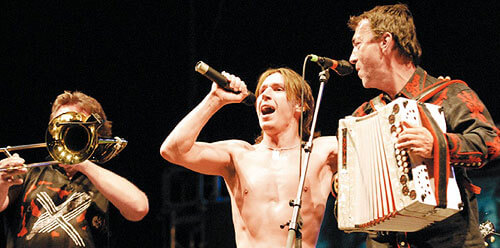
At night, when the music is played, the stage ship and the water of the Danube around it sparkle. Lights and screens that fill every stadium with sound beam across southern Ukraine.
Technical extravagance and logistical endeavours meet with the outback of a nation that has been painfully trying to find itself after 16 years independence from the Soviet Union. After Russia, the Ukraine is the biggest country in Europe in terms of area. The economic strengths are distributed with according difficulty. In Kiev revolutions take place, prosperity smokes from chimneys, international banks do business. However in the southeastern corner of the oblast of Odessa time stands still, although it is not quiet. Souped-up cars from the west roar. Coca Cola, mobile phones, cheap disco music and satellite TV have already won. But otherwise you hardly meet any winners.
The Venice of the Ukraine, a village in the middle of nowhere
"Our politicians concern themselves with the Crimea, with the capital," says Iwanka, who runs a food shop in the 8000 inhabitant village of Vylkove, called "Venice of the Ukraine" thanks to its (flood) waterways. Her husband commutes a good 1000 kilometres to work in Doneszk - she sees him once a month. In five years the Ukraine will play host to the European Cup football with Poland. Doneszk will be one of the locations. Here in Vylkove as much will be seen of it as in Bad Goisern: one will turn on the TV. Only here it is not certain whether there will be electricity.
The moon is the same here as there. In these cloudless days it is following the Goisern tour as an observer. With an effortless and kitsch beauty it serves as a symbol of connection free from boundaries, indeed solidarity. On board the ship one must work harder for this connection between musical styles and ways of living.
He is looking for musicians who looked for the same thing as he did, Hubert von Goisern says at a press conference in Ismail, explaining the artistic and human desires of the tour. It is late afternoon. In the evening around 6000 of the 79,000 citizens of the town will watch the concert in the harbour.
That evening the people come not only to see the Goiserer. They come for Zdob și Zdub and Haydamaky. The two bands have achieved hero status in the region with their mix of ethno and rock. The Moldovans Zdob și Zdub are particularly celebrated, being led by the charismatic Roman Iagupov, who seems like a brother of U2's Bono, or Anthony Kiedis from the Red Hot Chili Peppers in his ability to capture the audience. The party-fit "Zdobsis" are comparable with the style of Californian rock stars, with their dynamic, at times hammering and then once more balladic sounds. In 2005 they took part in the Eurovision Song Contest. There were plans to do that again this year - and with Hubert von Goisern. Nothing came of it. What remained was a joint version of Koa Hiatamadl, which rocks more intensely than ever before. This is also down to the pleasure the musicians take in each other. Here the sense of the Linz Danube Tour undertaking becomes apparent too: music as a uniting element, as a convergence of worlds. This approach works ideally with Haydamaky too. Hubert von Goisern starts to gush as he talks about the time with the Roma brass band Karandila, who were on board a few days before.
And yet the approach to folk music is very different here. At home the Goiserer had to fight it once more out of the hands of the protectors. In Moldova and the Ukraine traditional music formed the regional identities of the individual states during the time of the Soviet Union. "Folk was an act of resistance for our fathers," says Haydamaky singer Sascha. Enriching it with elements of pop now on the one hand serves the popularisation of tradition and is simultaneously a counter motion to the monopolisation of folk by growing nationalistic tendencies.
In Vylkove such political background barely plays a role. Around a quarter of the community is on their feet. At the market there has been no other topic of conversation than the arrival of the ship, says Ivanka. At the end of the evening she is dancing with one of the four policemen there for security. In contrast to Ismail, cold beer is prepared. There is also no VIP area erected by the local nomenklatura. If something happens here, everyone has to go.
A day later peace returns to the ship - and after nearly 40 days on board, routine too. It is broken on the way from Ismail to Vylkove 25 journalists come on board, flown in by sponsor Red Bull. This approach follows the laws of the industry. In quickly. Recording equipment and camera brandished. Away. And at the same time having the fortunes of witnessing a little of the way in which both the political and musical ideas of the tour are realised. Here in the outback, the message of the river being a unifying power, as a "symbol of freedom" as Zdobsi singer Iagupov puts it, is understood well. And here - even if more to the familiar sounds of the local bands than to the foreign, alpine sounds of the Goiserer troupe - parties are celebrated. There is little time for silent reflection during these two days.
The beauty of the forthcoming river kilometres
The ship offers little room for retreat, which could be filled with the emotional charge of impressions that accumulate on a long journey. Collecting, that works, although he "sometimes feels like a bottomless barrel", says Hubert von Goisern. And evaluating? Organising? Filing away? Every statement can only be a snapshot of fresh, unsorted feelings, the Goiserer says, a snapshot that is replaced the next day with the next band, the next river kilometre, the beauty or the bureaucratic hurdles of the next town. Another 18 kilometres until the Black Sea, where the Danube ends, where the "Wallsee" will drop anchor at Vylkove and where the northern edge of the delta is formed - and, since Romania's accession to the EU, a barely surmountable barrier for Ukrainians (the official way).
Captain Peter Werner observes the tour euphorically. "Whoever comes towards us radios us," he says. There are congratulations for the idea, for seeing through this insanity. And some ask whether what they have heard is correct, that a ship convoy is travelling along to give concerts at places that are neither on the tourist stretch, nor are they trading posts.
Vylkove symbolises the crossing into No-Man's Land. Those who come this far with the ship go straight to Sulina. There stands the lighthouse where the Danube begins. It is the only river split into kilometres upstream. There is where the music will play in two days.
